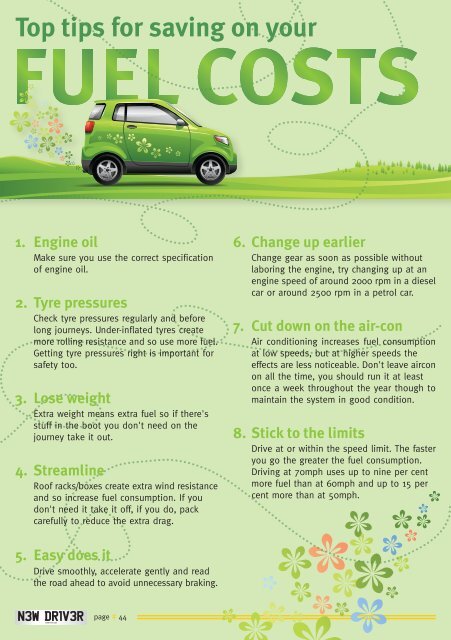Create successful ePaper yourself
Turn your PDF publications into a flip-book with our unique Google optimized e-Paper software.
Top tips for saving on your<br />
1. Engine oil<br />
Make sure you use the correct specification<br />
of engine oil.<br />
2. Tyre pressures<br />
Check tyre pressures regularly and before<br />
long journeys. Under-inflated tyres create<br />
more rolling resistance and so use more fuel.<br />
Getting tyre pressures right is important for<br />
safety too.<br />
3. Lose weight<br />
Extra weight means extra fuel so if there's<br />
stuff in the boot you don't need on the<br />
journey take it out.<br />
4. Streamline<br />
Roof racks/boxes create extra wind resistance<br />
and so increase fuel consumption. If you<br />
don't need it take it off, if you do, pack<br />
carefully to reduce the extra drag.<br />
6. Change up earlier<br />
Change gear as soon as possible without<br />
laboring the engine, try changing up at an<br />
engine speed of around 2000 rpm in a diesel<br />
car or around 2500 rpm in a petrol car.<br />
7. Cut down on the air-con<br />
Air conditioning increases fuel consumption<br />
at low speeds, but at higher speeds the<br />
effects are less noticeable. Don't leave aircon<br />
on all the time, you should run it at least<br />
once a week throughout the year though to<br />
maintain the system in good condition.<br />
8. Stick to the limits<br />
Drive at or within the speed limit. The faster<br />
you go the greater the fuel consumption.<br />
Driving at 70mph uses up to nine per cent<br />
more fuel than at 60mph and up to 15 per<br />
cent more than at 50mph.<br />
5. Easy does it<br />
Drive smoothly, accelerate gently and read<br />
the road ahead to avoid unnecessary braking.<br />
page # 44


